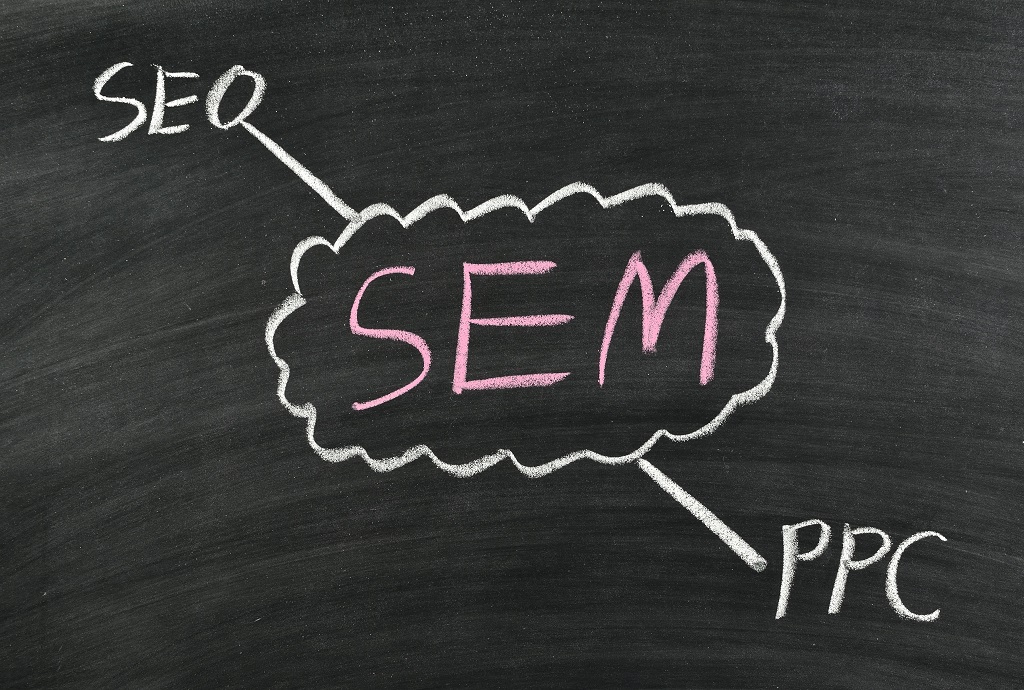
Nobody has to tell you the more visitors who find your site, the more potential you have for generating new leads. That’s exactly why search marketing matters.
Table of Contents
What Is Search Marketing, and Why Does It Matter?
Put simply, search marketing is the practice of drawing website traffic from search engines. The idea is, when someone’s already looking for what you offer, search marketing makes it easier to find you.
This gives your organization increased visibility, website visitors and potential for gaining new clients — all valuable commodities in the business world. The only problem? There’s more than one way to approach search marketing. How do you know which is right for you?
The Two Types of Search Marketing: SEO and PPC

When it comes to search marketing, there are two main approaches: search engine optimization (SEO) and pay-per-click advertising (PPC).
- SEO: Search engine optimization is the process of gaining traffic and visibility through unpaid, organic search results. You work to build content that naturally gets ranked well in search results. Results take time, and placement depends on many factors, including quality of the content, targeted keywords, links pointing to your website, and the structure of your website.
- PPC: Pay-per-click advertising, on the other hand, is the practice of paying for placement in search results. You skip the long-term effort of building page after page of content in an attempt to build authority. Instead, results are immediate, and ads appear at the top of search results pages, above organic results.
So, when should you focus on SEO and when should you invest in PPC? Here’s a look at the benefits of each option.
The Benefits of SEO: Cost-Effective Credibility
Both SEO and PPC have distinct benefits, but many businesses view SEO as more beneficial. Why? Here are some of the specific advantages of this option:
- It’s credible. Because search results are organic, they are often seen as more credible than the paid ads at the top of search pages. Prospects may be more likely to click what appears there than on paid listings.
- It’s effective. SEO tends to generate a higher click-through rate (CTR) than PPC advertising. Why? Again, because users see organic results as credible, they are more likely to click high-ranking organic results.
- It offers long-term benefits. Paid advertisements work only as long as they’re running. When you stop paying, the ads stop showing. For this reason, organic search results have another advantage: long-term benefits to keep driving traffic over time.
Looking at the benefits of SEO, it’s not hard to see why it’s powerful for businesses. Still, it’s not the only useful search marketing strategy.
The Benefits of PPC: Fast and Controllable
While some businesses focus on SEO, others emphasize PPC. Why? In terms of speed and control, PPC offers a few advantages of SEO can’t beat. Here are a few of the biggest benefits of PPC advertising:
- It’s immediate. Your business can be placed on search results pages right away with PCC advertising. You don’t have to wait to build authority or a large body of content that gets picked up by search engines; you simply pay a fee and start seeing placement.
- It’s controllable. While SEO is a matter of trying to anticipate what content search engines will pick up and use, PPC is search marketing that gives you much more control. You choose your message, write your calls to action, can add bullet points, can feature pricing information, etc., to create exactly the information display you want users to see. Likewise, PPC lets you display your ads to specific geographic audiences, and further narrow the focus to specific days and times of day, specific devices, and other variables.
- It’s effective. While SEO offers higher click-through rates, PPC potentially offers higher conversions. Conversion rates for PPC ads are especially strong when the ad has a highly appealing offer and well-constructed landing page.
How Do You Know Which to Use?
Because both SEO and PPC offer distinct advantages, each one can be useful to businesses today. Deciding which to use is a matter of knowing your situation and what you need. So, what should you focus on? Here are some examples of situations where one or the other type of search marketing will be most effective for you:
- When you’re a new business, try PPC. Even if you opened shop last week, PPC advertising can get you on the first page for a specific search term right away. When you’re a new business looking to gain visibility and generate interest, PPC can be the perfect solution.
- When you have a low budget, focus on SEO. When you’re short on funding but have time to invest, creating a long-term content strategy can be the best way to go. Build a large body of quality, keyword-optimized content and web links that will help you rise higher in search results and drive traffic over time — probably at a lower initial cost than PPC.
- When you have a limited-time offer to promote, use PPC. Say you’re launching a product promotion or special offer and want to spread the word. PPC is a great way to drive traffic to that offer for a specific amount of time, in precisely the way you want to do it.
- When you’re looking for longtime benefits, use SEO. When you know you’re looking for long-term search benefits, you can’t beat SEO. Even after you’ve built content and established authority, you’ll continue seeing results well into the future.
Do any of the above situations sound like you? Use that to guide your search marketing approach. Do more than one of the situations describe your business? Don’t think you’re limited to only one approach. After all, when it comes to PPC and SEO, there’s no reason you can’t use both to your advantage — and drive both organic and paid visibility for your brand.